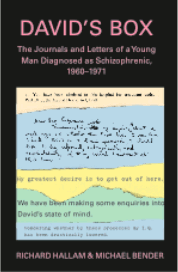Richard Hallam and Michael Bender, July 2011
Polpresa Press | ISBN 978-0-9560975-1-4 | Paperback | RRP £15.99
These edited journals of a highly intelligent young man document in painstaking detail what it was like to be diagnosed with schizophrenia in the 1960s - the dehumanising attitudes, the inept prescription of drugs, and other shortcomings of mental health services. "David" eventually manages to sustain an unskilled job and move into a bedsitter but is now faced with goading from his fellow workers and social isolation. Giving up the job he hates and faced with a return to living in a half-way house, he calmly tells us why he made his final decision.

The journals give an insight into the experience of madness that no textbook or retrospective account could supply. David was a fly on his own wall, attempting all along to make sense of his life, but barely succeeding. His perceptive observations inform us of the dilemmas that continue to challenge mental health professionals, and 'service users' today. For this reason, the authors have added a chapter on the changes to mental health services since 1970 and evaluate what progress has been made.
Richard Hallam and Michael Bender are clinical psychologists who worked in the UK National Health and Social Services in the late 1960s. They are both internationally recognised authors who have published many books in their own areas of expertise. In her foreword, Jacqui Dillon, Chair of the National Hearing Voices Network, England, introduces David's Box as an account of survival in adversity.
![]() Advance reviews
Advance reviews
Glenn D Shean, PhD, Professor of Psychology, College of William & Mary, Virginia
Joanna Moncrieff, MD, Senior Lecturer in Social and Community Psychiatry, University College London
Mary Boyle, PhD, Emeritus Professor of Clinical Psychology, University of East London
Charley Baker, Lecturer in Mental Health, University of Nottingham

For larger quantities or trade contact polpresa@gmail.com
Polpresa Press, 56 Limes Grove, London SE13 6DE
![]()
All content © Richard Hallam 2009-2022
